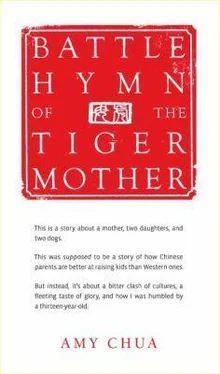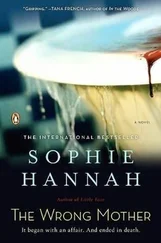Back in New Haven a few months later, when I referred in passing to Sophia as being Chinese, she interrupted me: “Mommy — I’m not Chinese.”
“Yes, you are.”
“No, Mommy — you’re the only one who thinks so. No one in China thinks I’m Chinese. No one in America thinks I’m Chinese.”
This bothered me intensely, but all I said was, “Well, they’re all wrong. You are Chinese.”
Sophia had her first big music moment in 2003 when she won the Greater New Haven Concerto Competition at the age of ten, earning the right to perform as a piano soloist with a New Haven youth orchestra at Yale University’s Battell Chapel. I went wild. I blew up the article about Sophia in the local newspaper and framed it. I invited more than a hundred people to the concert and planned a huge after-party. I bought Sophia her first full-length gown and new shoes. All four grandparents came; the day before the performance, my mother was in our kitchen making hundreds of Chinese pearl balls (pork meatballs covered with sticky white rice), while Florence made ten pounds of gravlax (salmon cured with sea salt under a brick).
Meanwhile, on the practice front, we kicked into overdrive. Sophia was going to perform Mozart’s Rondo for Piano and Orchestra in D Major, one of the composer’s most uplifting pieces. Mozart is notoriously difficult. His music is famously sparkling, brilliant, effervescent, and effortless — adjectives that strike terror in the hearts of most musicians. There’s a saying that only the young and old can play Mozart well: the young because they are oblivious and the old because they are no longer trying to impress anyone. Sophia’s Rondo was classic Mozart. Her teacher Michelle told her, “When you’re playing your runs and trills, think of champagne or an Italian soda, and all those bubbles rising to the top.”
Sophia was up to any challenge. She was an unbelievably quick study, with lightning-quick fingers. Best of all, she listened to everything I said.
By then, I had become a drill sergeant. I broke the Rondo down, sometimes by section, sometimes by goal. We’d spend one hour focusing just on articulation (clarity of notes), then another on tempo (with the metronome), followed by another on dynamics (loud, soft, crescendo, decrescendo ), then another on phrasing (shaping musical lines), and so on. We worked late into the night every day for weeks. I spared no harsh words, and got even tougher when Sophia’s eyes filled with tears.
When the big day finally arrived, I was suddenly paralyzed; I could never be a performer myself. But Sophia just seemed excited. At Battell Chapel, when she walked out onto the stage to take her soloist’s bow, she had a big smile on her face, and I could tell she was happy. As I watched her performing the piece — in the imposing dark-oak hall, she looked tiny and brave at the piano — my heart ached with a kind of indescribable pain.
Afterward, friends and strangers came up to congratulate Jed and me. Sophia’s performance was breathtaking, they said, her playing so graceful and elegant. Sophia clearly was a Mozart person, a beaming Michelle told us, and she had never heard the Rondo sound so fresh and sparkling. “It’s obvious that she’s enjoying herself,” Larry, the boisterous director of the Neighborhood Music School, said to me. “You can’t sound that good if you’re not having fun.”
For some reason, Larry’s comment reminded me of an incident from many years before, when Sophia was just starting the piano but I was already pushing hard. Jed discovered some funny marks on the piano, on the wood just above middle C. When he asked Sophia about them, a guilty look came over her. “What did you say?” she asked evasively.
Jed crouched down and examined them more closely. “Sophia,” he said slowly, “could these possibly be teeth marks?”
It turned out they were. After more questioning, Sophia, who was perhaps six at the time, confessed that she often gnawed on the piano. When Jed explained that the piano was the most expensive piece of furniture we owned, Sophia promised not to do it again. I’m not quite sure why Larry’s remark brought that episode to mind.
11
“The Little White Donkey”

Here’s a story in favor of coercion, Chinese-style. Lulu was about seven, still playing two instruments, and working on a piano piece called “The Little White Donkey” by the French composer Jacques Ibert. The piece is really cute — you can just imagine a little donkey ambling along a country road with its master — but it’s also incredibly difficult for young players because the two hands have to keep schizophrenically different rhythms.
Lulu couldn’t do it. We worked on it nonstop for a week, drilling each of her hands separately, over and over. But whenever we tried putting the hands together, one always morphed into the other, and everything fell apart. Finally, the day before her lesson, Lulu announced in exasperation that she was giving up and stomped off.
“Get back to the piano now,” I ordered.
“You can’t make me.”
“Oh yes, I can.”
Back at the piano, Lulu made me pay. She punched, thrashed, and kicked. She grabbed the music score and tore it to shreds. I taped the score back together and encased it in a plastic shield so that it could never be destroyed again. Then I hauled Lulu’s doll-house to the car and told her I’d donate it to the Salvation Army piece by piece if she didn’t have “The Little White Donkey” perfect by the next day. When Lulu said, “I thought you were going to the Salvation Army, why are you still here?” I threatened her with no lunch, no dinner, no Christmas or Hanukkah presents, no birthday parties for two, three, four years. When she still kept playing it wrong, I told her she was purposely working herself into a frenzy because she was secretly afraid she couldn’t do it. I told her to stop being lazy, cowardly, self-indulgent, and pathetic.
Jed took me aside. He told me to stop insulting Lulu — which I wasn’t even doing, I was just motivating her — and that he didn’t think threatening Lulu was helpful. Also, he said, maybe Lulu really just couldn’t do the technique — perhaps she didn’t have the coordination yet — had I considered that possibility?
“You just don’t believe in her,” I accused.
“That’s ridiculous,” Jed said scornfully. “Of course I do.”
“Sophia could play the piece when she was this age.”
“But Lulu and Sophia are different people,” Jed pointed out.
“Oh no, not this,” I said, rolling my eyes. “Everyone is special in their special own way,” I mimicked sarcastically. “Even losers are special in their own special way. Well don’t worry, you don’t have to lift a finger. I’m willing to put in as long as it takes, and I’m happy to be the one hated. And you can be the one they adore because you make them pancakes and take them to Yankees games.”
I rolled up my sleeves and went back to Lulu. I used every weapon and tactic I could think of. We worked right through dinner into the night, and I wouldn’t let Lulu get up, not for water, not even to go to the bathroom. The house became a war zone, and I lost my voice yelling, but still there seemed to be only negative progress, and even I began to have doubts.
Then, out of the blue, Lulu did it. Her hands suddenly came together — her right and left hands each doing their own imperturbable thing — just like that.
Lulu realized it the same time I did. I held my breath. She tried it tentatively again. Then she played it more confidently and faster, and still the rhythm held. A moment later, she was beaming. “Mommy, look — it’s easy!” After that, she wanted to play the piece over and over and wouldn’t leave the piano. That night, she came to sleep in my bed, and we snuggled and hugged, cracking each other up. When she performed “The Little White Donkey” at a recital a few weeks later, parents came up to me and said, “What a perfect piece for Lulu — it’s so spunky and so her .”
Читать дальше













